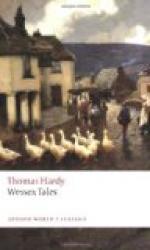On the hearth, in front of a back-brand to give substance, blazed a fire of thorns, that crackled ‘like the laughter of the fool.’
Nineteen persons were gathered here. Of these, five women, wearing gowns of various bright hues, sat in chairs along the wall; girls shy and not shy filled the window-bench; four men, including Charley Jake the hedge-carpenter, Elijah New the parish-clerk, and John Pitcher, a neighbouring dairyman, the shepherd’s father-in-law, lolled in the settle; a young man and maid, who were blushing over tentative pourparlers on a life-companionship, sat beneath the corner-cupboard; and an elderly engaged man of fifty or upward moved restlessly about from spots where his betrothed was not to the spot where she was. Enjoyment was pretty general, and so much the more prevailed in being unhampered by conventional restrictions. Absolute confidence in each other’s good opinion begat perfect ease, while the finishing stroke of manner, amounting to a truly princely serenity, was lent to the majority by the absence of any expression or trait denoting that they wished to get on in the world, enlarge their minds, or do any eclipsing thing whatever—which nowadays so generally nips the bloom and bonhomie of all except the two extremes of the social scale.
Shepherd Fennel had married well, his wife being a dairyman’s daughter from a vale at a distance, who brought fifty guineas in her pocket—and kept them there, till they should be required for ministering to the needs of a coming family. This frugal woman had been somewhat exercised as to the character that should be given to the gathering. A sit-still party had its advantages; but an undisturbed position of ease in chairs and settles was apt to lead on the men to such an unconscionable deal of toping that they would sometimes fairly drink the house dry. A dancing-party was the alternative; but this, while avoiding the foregoing objection on the score of good drink, had a counterbalancing disadvantage in the matter of good victuals, the ravenous appetites engendered by the exercise causing immense havoc in the buttery. Shepherdess Fennel fell back upon the intermediate plan of mingling short dances with short periods of talk and singing, so as to hinder any ungovernable rage in either. But this scheme was entirely confined to her own gentle mind: the shepherd himself was in the mood to exhibit the most reckless phases of hospitality.
The fiddler was a boy of those parts, about twelve years of age, who had a wonderful dexterity in jigs and reels, though his fingers were so small and short as to necessitate a constant shifting for the high notes, from which he scrambled back to the first position with sounds not of unmixed purity of tone. At seven the shrill tweedle-dee of this youngster had begun, accompanied by a booming ground-bass from Elijah New, the parish-clerk, who had thoughtfully brought with him his favourite musical instrument, the serpent. Dancing was instantaneous, Mrs. Fennel privately enjoining the players on no account to let the dance exceed the length of a quarter of an hour.




